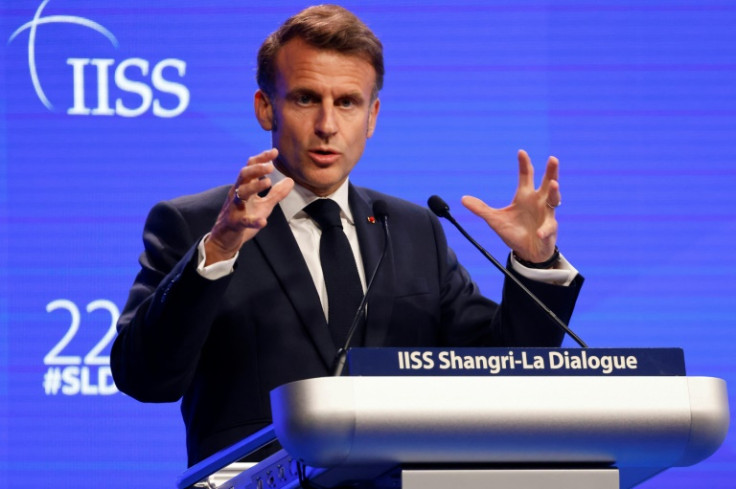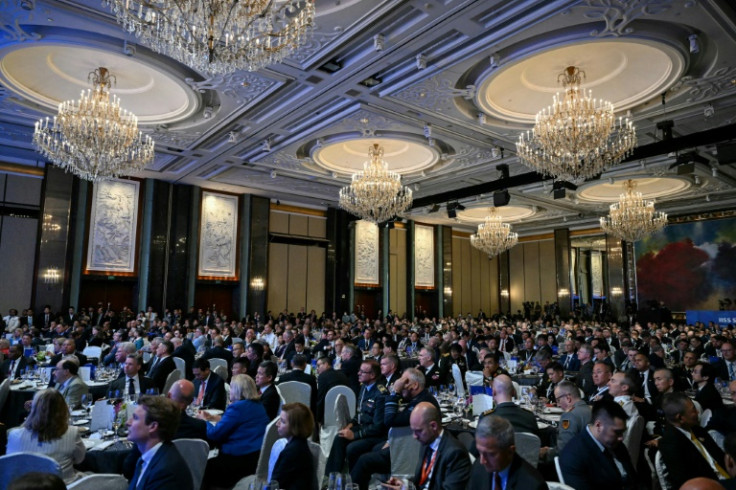Macron Urges Asia, Europe To Unite To Resist 'Spheres Of Coercion'

French President Emmanuel Macron on Friday urged Europe and Asia to build a new alliance to hold off big powers seeking to build "spheres of coercion", in a swipe at China and Russia.
Macron was speaking at the Shangri-La Dialogue in Singapore, Asia's major annual defence and security conference, as Russia defies diplomatic pressure for a ceasefire in Ukraine and capitals fret about Beijing's growing assertiveness on Taiwan and the South China Sea.
Macron urged the international community to unite in the face of countries seeking to grab territory and resources.
"We have a challenge of revisionist countries that want to impose -- under the name of spheres of influence -- spheres of coercion," Macron said.
"Countries that want to control areas from the fringes of Europe to the archipelagos in the South China Sea... that want to appropriate resources, whether fishing or mineral and crowd out others for their benefit."
Defence chiefs and officials from around the world are attending the annual forum that has in recent years become a barometer of US-China relations.
US Secretary of Defense Pete Hegseth will address the conference on Saturday after President Donald Trump fired a fresh salvo in his tariff battle with Beijing, which has roiled global money markets.
But unusually, China has not sent its defence minister to Shangri-La, and will instead be represented by a senior officer from its People's Liberation Army's National Defence University.
Since 2019 Beijing has regularly sent its defence minister to the Shangri-La meet, occasions that offered rare opportunities to hold face-to-face talks with US counterparts.
Macron's speech came at the end of a tour of Vietnam, Indonesia and Singapore, which he used to present France as a reliable alternative for a region caught between Washington and Beijing.
Asian countries have found themselves torn between Washington's tariff threats on one hand and Beijing, a major trading partner that has become increasingly forthright in territorial disputes in the South China Sea.
Tensions between Washington and Beijing have ramped up since Trump returned to office in January, off the back of an escalating trade standoff, intensified technological rivalry, and strategic military posturing.
Macron urged leaders at the conference to "build a positive new alliance between Europe and Asia, based on our common norms, on our common principles".
"Our shared responsibility is to ensure with others that our countries are not collateral victims of the imbalances linked to the choices made by the superpowers," he said.
Macron urged China to stop its ally North Korea from sending forces to help Russia's war in Ukraine if Beijing "doesn't want NATO being involved in Southeast Asia or in Asia".
He warned Asian leaders against seeing the war in Ukraine as a distant problem with no relevance to them.
"If we consider that Russia could be allowed to take a part of the territory of Ukraine without any restriction, without any constraint, without any reaction of the global order, how would you phrase what could happen in Taiwan?" he said.
"What would you do the day something happens in the Philippines?"
Macron also weighed in on the war in Gaza, warning that abandoning the shattered Palestinian enclave would kill the West's credibility with the rest of the world.
"If we abandon Gaza, if we consider there is a free pass for Israel, even if we do condemn the terrorist attacks, we will kill our credibility," he said.
His comments came as Israel accused him of undertaking a "crusade against the Jewish state" after he called for European countries to harden their stance on Israel if the humanitarian situation in Gaza did not improve.
Beyond the conflicts in Gaza and Ukraine, the recent clashes between India and Pakistan will lurk in the shadows of the conference, which runs until Sunday.
An April 22 attack on tourists in Indian-administered Kashmir triggered some of the worst cross-border clashes between the nuclear-armed neighbours in years, with at least 70 people killed.
Muslim-majority Kashmir is claimed in full by both countries, which have fought multiple wars over the Himalayan territory since their 1947 independence from Britain.
New Delhi accused Pakistan of backing the attack, a charge Islamabad denies.
Neither side has sent their defence ministers, instead dispatching senior military delegations. No meeting between the two sides has been announced.

© Copyright AFP 2026. All rights reserved.





















